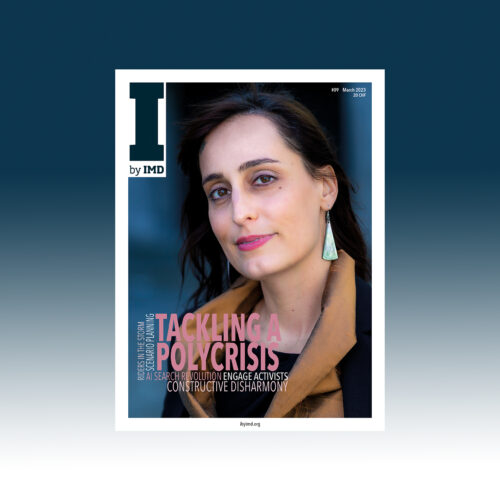
Why leaders should learn to value the boundary spanners
Entrepreneurial talent who work with other teams often run into trouble with their managers. Here are ways to get the most out of your ‘boundary spanners’...
Audio available

by Jean-Pierre Danthine, Florence Hugard Published May 3, 2023 in Audio articles • 6 min read •

The climate challenge should be viewed as an opportunity for the financial industry. After being on the wrong side of history in the financial crisis, it can now redeem itself by being a force for good, and even prospering, in the face of the energy transition.
To be sure, this is a tall order. When sustainability is in the frame, public opinion tends to depict investors and financiers as accomplices and authors of greenwashing rather than allies of the energy transition. What is needed for this to change and for the opportunity to be seized?
First, it is important to reassess the power of finance. It can be a force for good but is not omnipotent. The financial sector can provide important funding, but capital markets can often be bypassed, meaning that they cannot be counted on to ensure that some activities – such as digging for oil or gas – will be prevented. For example, claims by banks that halting the financing of offshore oil and gas projects will slow or stop fossil fuel production mask the reality that they are not the only source of financing for the sector. Those truly in the driver’s seat are governments, through their regulatory mandate, and ultimately consumers – not financiers.
Second, focusing on strategies and instruments that lead to concrete results is vital for avoiding any association with greenwashing. There are three courses of action that investors and their intermediaries can take when it comes to companies they are engaged with, or which they are assessing for some sort of engagement.

Geopolitical tensions, persistent inflation, economic weakness, climate change, and sustainability. Business leaders are dealing with an unprecedented range of challenges simultaneously, making it harder than ever to know how to prioritize, navigate, and communicate effectively with teams. Scenario planning, listening and leading in new ways are part of the answer. In Issue IX of I by IMD, we unpack new approaches to dealing with the polycrisis that's facing us.
First, they can divest from businesses whose targets they consider are not aligned with societal goals. For example, ESG funds may exclude “brown” companies from their portfolios, notably those involved in the production of fossil fuels.
Second, investors can make use of their rights as ultimate owners or privileged capital providers to engage with them on their journey towards sustainability.
Third, investors can finance the pursuit of projects that facilitate the sustainability transition.
Our research into the effectiveness and limitation of each of these three has found that, while there is no magic bullet, the last two are more promising than the first.
This strategy is often adopted under the pressure of activists, which hope to bring about a “capital rationing” (sometimes also called “financial rationing”) effect on the target company, triggered by investors when they sell their positions in companies of which they disapprove. Our literature review, however, shows that this hope is generally based on unrealistic expectations.
That’s because such rationing can directly happen only on the primary markets (and even then, under a very limited set of conditions) in the case of new equity issuance or direct bank lending, while most investors are only active on secondary markets where they exchange assets between themselves without contact with the original issuer. This means that the company – the intended target of a divestment – remains largely unaffected.

There are two mechanisms through which some indirect effect of capital rationing can be seen in the secondary markets.
First, public divestment by a large investor or group of investors may lead to falls in value that may raise the targeted company’s cost of capital. Even here, however, the effect can be overestimated. The reality is that while a brown company is indeed likely to have a higher cost of capital than a green one, this is due to the intrinsic characteristics of the company, as assessed by financial markets. It is unlikely to be significantly affected by a divestment decision, which may only have the effect of stigmatizing the company in a general way.
It’s reasonable to assume that the sudden loss in the value of a business that might result from a decision to divest could also affect managers’ incentive packages, and thereby prompt management to alter its strategy. However, incentive packages are often immune to this potential effect, especially when the divestment decisions concern an entire industry. That is because compensation packages are usually based on the stock performance of the company relative to its peers, rather than on its absolute performance. Managers’ behavior is less likely to be affected if the divestment decision is not framed as a threat, and if decisions around pay are made strategically.
Engaging with companies offers the generally good prospect of a positive impact on target businesses as well as a tangible change in their strategy.
Our literature review shows that mature, ESG-conscious companies are most likely to comply with shareholder demands. Local institutional investors with a history of successful engagement with a partner company appear to achieve their goals more often. In addition, multi-level collaborative engagements, initiatives focusing on corporate governance or more aggressive approaches appear to be more successful.
Although less responsive to engagement, smaller companies and laggards should not be left out of the process
Although less responsive to engagement, smaller companies and laggards should not be left out of the process. Increased engagement and collaboration by investors with other actors such as bond investors and creditors can help when initial engagement fails.
One basic step that financiers should take to have the desired influence is to require the companies in which they are investing to disclose all the information related to their sustainability objectives. This information is essential for investors to be able to assess the risks and rationale of their financial positions. As an additional step, investors can adopt a critical attitude when evaluating the sustainability strategy of companies and engaging with them if the situation is not satisfactory.
It stands to reason that providing privileged finance to green companies or helping finance the transitioning of brown firms to a more sustainable business model is where investors can act most effectively as a force for good. This can take place in the form of equity financing (such as thematic funds focusing on cleantech and social impact) or investing in securities such as green or sustainability linked bonds.
Yet challenges remain in terms of reporting standards, issuers’ credibility, and the size of sustainable debt markets. While market actors and regulators have put forward some voluntary guidelines for reporting standards and industry taxonomies do exist, there is no legislation enforcing impact reporting requirements. This creates a greenwashing risk. Granting sustainability credentials to firms with no credible climate goals in the short-, medium-, and long-term can also discredit sustainable debt instruments.
Interestingly, this third form of intervention is one where active fund management – which much of the academic literature has deemed to be not that effective – can add critical value. Financial advisers may be able to identify future winners and losers, with a view to generating above average returns, by conducting in-depth research of societal transition that goes beyond analyzing historical data. This is one area where it is possible to do well while also doing good.
The role of Finance in the Energy Transition: read the full report by clicking here.

Professor at the EPFL (Ecole Polytechnique Fédérale de Lausanne – College of Management of Technology), Managing Director of the Enterprise of Society Center (E4S) and President of the Paris School of Economics
Jean-Pierre Danthine is Professor at the École Polytechnique Fédérale de Lausanne – College of Management of Technology (EPFL), Managing Director of the Enterprise of Society Center (E4S) and President of the Paris School of Economics. He was a member of the Governing Board of the Swiss National Bank (SNB) from 2010 to 2012 and its vice chairman from 2012 until 2015.

Scientific Collaborator at E4S
Florence Hugard is Scientific Collaborator at E4S where she contributes research in the field of sustainability and finance. Prior to joining E4S, she worked as a teaching assistant at the Faculty of Business and Economics of the University of Lausanne, and at Swiss Re as an intern in distributed ledger technology research.

July 3, 2025 • by Eric Quintane in Audio articles
Entrepreneurial talent who work with other teams often run into trouble with their managers. Here are ways to get the most out of your ‘boundary spanners’...
 Audio available
Audio available
June 24, 2025 • by Jerry Davis in Audio articles
The tech broligarchs have invested heavily in Donald Trump but are not getting the payback they bargained for. Do big business and the markets still shape US government policy, or is the...
 Audio available
Audio available
June 19, 2025 • by David Bach, Richard Baldwin, Simon J. Evenett in Audio articles
As governments lock horns in our increasingly multipolar world, long-held assumptions are being upended. Forward-looking executives realize the next phase of globalization necessitates novel approaches....
 Audio available
Audio available
June 2, 2025 • by George Kohlrieser in Audio articles
Leadership Honesty and courage: building on the cornerstones of trust by George Kohlrieser Published 17 April 2025 in Leadership • 5 min read DownloadSave Trust is the bedrock of effective leadership. It...
 Audio available
Audio availableExplore first person business intelligence from top minds curated for a global executive audience